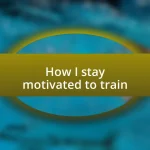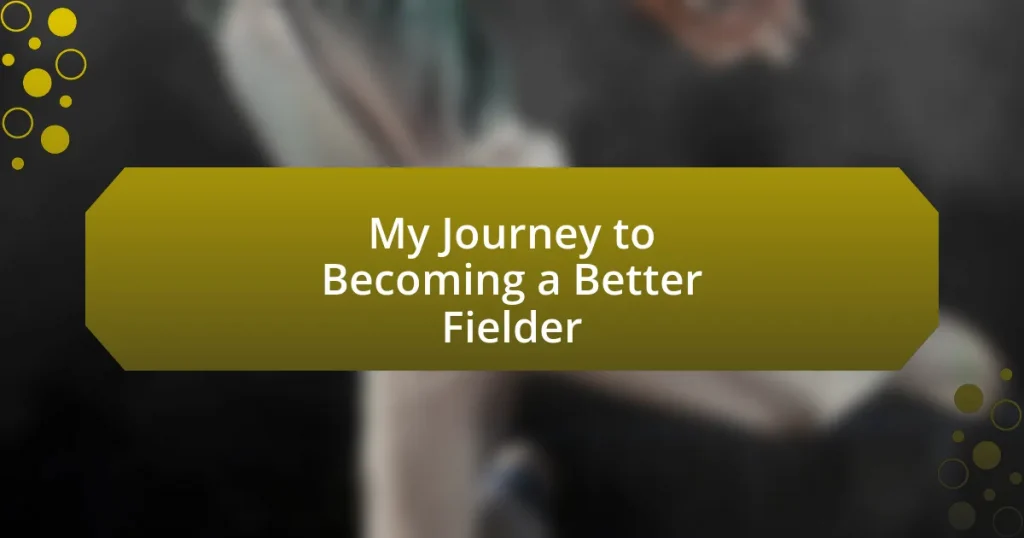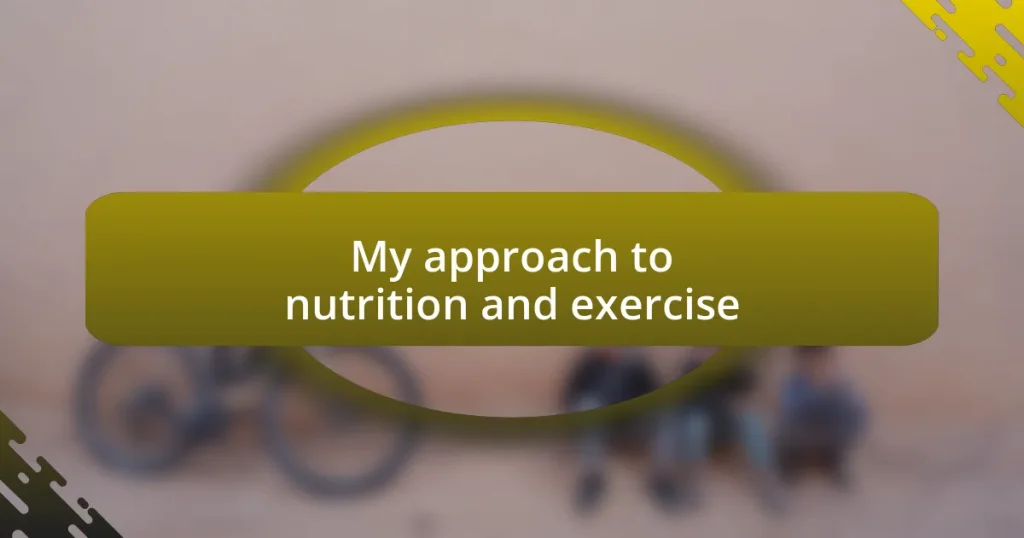Key takeaways:
- Fielding involves key fundamentals such as stance, hand-eye coordination, footwork, focus, and communication that contribute to overall effectiveness.
- Developing hand-eye coordination and practicing footwork techniques significantly enhance performance on the field.
- Reading the game proactively and understanding team dynamics can transform a player’s approach and effectiveness in fielding.
- Monitoring progress through journaling and setting measurable goals fosters growth and builds confidence in skills development.

My first experience with fielding
I still vividly remember my very first experience with fielding. I was probably around ten, standing in the outfield for my little league team, and feeling an exhilarating mix of excitement and nerves. The moment a fly ball arced towards me, I felt the weight of the game on my shoulders—could I really catch it?
As the ball soared through the air, I instinctively froze, mesmerized by it. Did I just think too much? I remember grappling with a whirlwind of emotions: anxiety, fear of failure, and the exhilarating thrill of the challenge. I’ve always wondered how that fear transformed into determination over time.
In that moment, my heart raced, and as I lunged forward, I missed the catch, feeling the sharp sting of disappointment. Yet, deep down, I felt a spark igniting within me—a drive to improve. That experience taught me something invaluable: every setback is a step toward learning and growth in my journey to becoming a better fielder.

Understanding the fundamentals of fielding
Understanding the fundamentals of fielding is essential for any aspiring fielder. I learned early on that successful fielding is more than just catching the ball; it involves positioning, timing, and communication with teammates. Over the years, I’ve come to appreciate the subtle nuances that contribute to effective fielding.
Here are some key fundamentals to keep in mind:
- Stance and Positioning: Always be ready, with knees slightly bent. A good starting position allows for better reaction times.
- Hand-eye Coordination: Practice tracking the ball from the pitcher’s hand to your glove. This skill improves with repetitive drills.
- Footwork: Quick, agile movements toward the ball can make all the difference. I often remind myself to take the shortest path to it.
- Focus and Awareness: Keep your eyes on the game, not just the ball. Anticipating where the ball will go helps in making smarter plays.
- Communication: I’ve found that talking to my teammates, especially in the outfield, prevents collisions and strengthens team dynamics.
Each of these fundamentals serves as a building block in my fielding journey, weaving together the skills that I’ve honed over time. The process has certainly been a journey, with moments of clarity and challenges that shaped my understanding of the game.
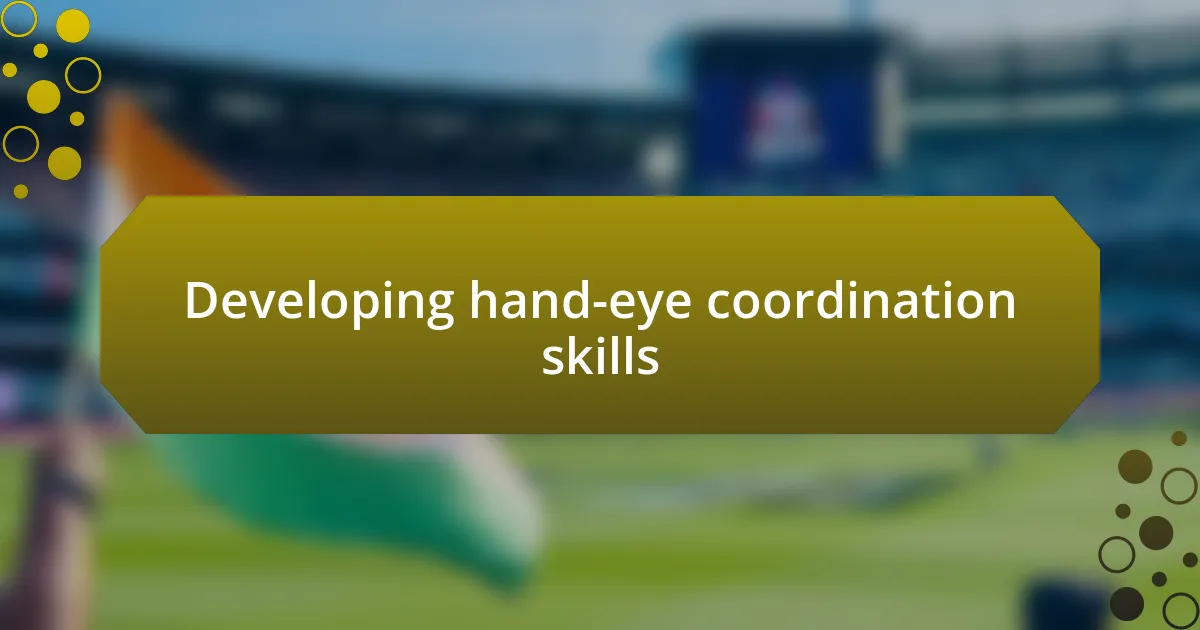
Developing hand-eye coordination skills
When I first started focusing on hand-eye coordination, I realized it was crucial not only for catching but also for throwing accurately. I remember practicing by tossing a tennis ball against a wall, trying to catch it with one hand. It felt frustrating at times, especially when my hands seemed faster than my eyes. Gradually, I found that my ability to track the ball improved, and this small exercise made a significant impact on my overall fielding abilities.
Engaging in various drills has been incredibly rewarding. I often set up cones to mimic potential play situations while having a partner throw balls at different angles. The combination of movement and reaction honed my hand-eye coordination. It was exhilarating when I started to catch balls I previously would have missed. I’ve learned that consistent practice and being attentive to these details are what truly drive improvement.
To enhance hand-eye coordination, I’ve also incorporated visual tracking exercises into my routine. One simple yet effective drill involves watching a moving object and maintaining focus on it. The transformation in my catching skills was remarkable, leading to more confident plays during games. Sharing these experiences reminds me of how crucial it is for all fielders to work on this skill diligently; it’s truly the cornerstone of effective fielding.
| Drill Type | Description |
|---|---|
| Toss Against Wall | Simple toss with one hand to enhance tracking |
| Partner Cone Drill | Sets up scenarios requiring quick reactions |
| Visual Tracking | Focus on a moving object to sharpen coordination |

Practicing effective footwork techniques
Practicing effective footwork techniques has been a game-changer in my journey as a fielder. I can vividly remember the first time I tried ladder drills; the rhythm and precision required felt foreign but exciting. Each step seemed like a dance, where every small adjustment made a bigger impact on my overall agility and balance. Have you ever felt that tingle of excitement when your feet move exactly as you want them to? I certainly have, and it’s an empowering experience.
One drill that really stood out for me is the side shuffle. At first, it felt awkward, but I gradually learned how to position my feet strategically. I realized the importance of keeping my knees bent and my weight on the balls of my feet, enabling quick lateral movements. I still remember the moment during a practice game when my improved footwork allowed me to make a challenging play that I would have previously missed. That sense of accomplishment was definitely worth all the sweat.
Incorporating footwork drills into my routine isn’t just about enhancing my skills; it’s also about building the confidence to tackle any situation on the field. I often set up cones to practice various movements, and each successful drill reinforces my muscle memory. Have you taken the time to evaluate how your footwork enhances your defensive play? Understanding this connection has deepened my appreciation for every catch I make and every game I play.

Learning to read the game
Learning to read the game is a skill I’ve cultivated through countless hours of observation and practice. One memorable moment that stands out was during a scrimmage when I noticed how the opposing players communicated through their body language. I found myself anticipating their next move just by watching their positioning. Have you ever watched a player and guessed what they were going to do next? It’s an exhilarating feeling when you start to see the game unfold before your eyes.
In my journey, I’ve learned that reading the game isn’t solely about being reactive; it’s about being proactive. I recall a time when I shifted my positioning based on the pitcher’s rhythm. Instead of just waiting for the ball, I positioned myself accordingly, which allowed me to intercept a hit I would’ve previously missed. This experience taught me the value of foreseeing plays rather than merely responding to them.
There’s a certain thrill in understanding the flow of the game. Every time I step onto the field, I remind myself to stay alert—eyes scanning, mind analyzing. It’s like being part of an intricate puzzle where each player’s move contributes to the whole. What do you think would happen if you focused entirely on reading your opponents? I believe it could transform not just your playstyle, but your entire approach to the game.

Acquiring advanced fielding strategies
Acquiring advanced fielding strategies requires a deep dive into both technique and mental preparation. I recall a specific drill I practiced that involved simulating various game scenarios with teammates. In these sessions, I learned to adapt my fielding position according to the type of batter at the plate. Have you ever noticed how certain hitters favor specific areas of the field? Understanding these tendencies helped me improve my positioning and reactions.
One critical element of advanced fielding is communication with teammates. I’ve found that discussing potential plays before the game cultivates a strong sense of teamwork. During one game, a well-timed call from a fellow fielder helped us execute a double play that turned the tide in our favor. It was a reminder that fielding isn’t just about individual skills; it’s a collective effort. How often do you talk with your teammates about strategies? I believe that these conversations can sharpen your instincts on the field.
Moreover, developing advanced strategies requires constant self-evaluation and adjustment. After each game, I would review my performance and identify areas where I could improve. This process helped me focus on specific skills, like quickly transitioning from catching to throwing. Each time I made those adjustments, I felt a wave of confidence knowing I was becoming a more versatile player. Have you ever taken time to analyze your plays? It’s a game-changer when you start seeing yourself from an outside perspective.
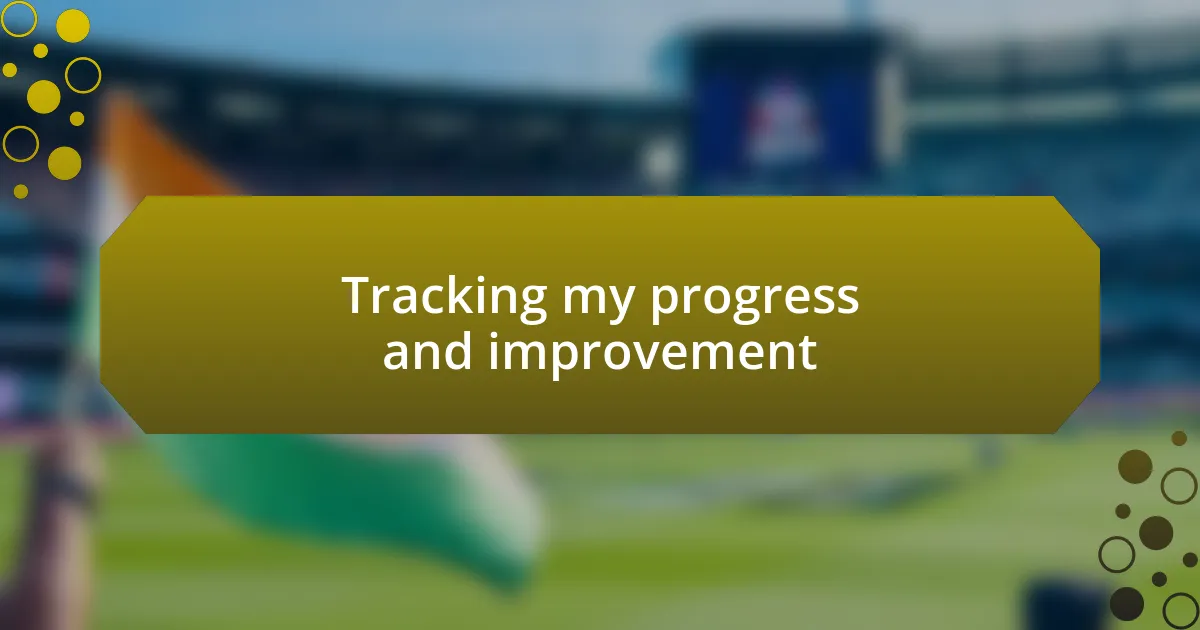
Tracking my progress and improvement
Monitoring my progress has been a transformative experience. I started keeping a journal after each practice and game, noting my successes and setbacks. Reflecting on a particularly rough game, I wrote about how my nerves led to missed catches. That exercise not only brought clarity but also motivated me to face my challenges head-on.
I also set specific, measurable goals for myself at the start of the season. For instance, I aimed to reduce my error count by 50% over a span of ten games. Tracking those numbers was eye-opening. Each time I achieved a milestone, it generated a rush of satisfaction that fueled my drive. Have you ever set a goal that changed how you approached your training?
Perhaps the most rewarding part of this journey has been the feedback I received from my coaches. After implementing their advice on positioning, I noticed a marked improvement in my response time during games. Their encouragement reinforced my belief that vulnerability leads to growth. Isn’t it amazing how constructive criticism can shape our skills for the better? Embracing that feedback has truly been essential for my development as a fielder.





